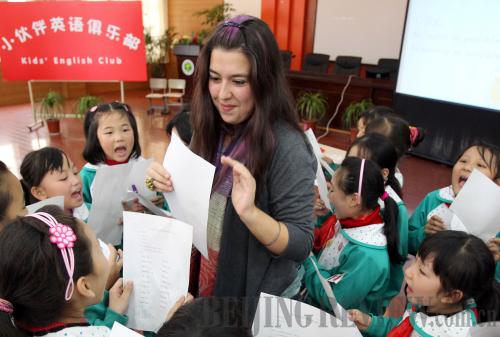|
 |
|
HAPPY TIME: Students read English following a foreign teacher at Shanghai Huiwen Primary School, a private school in the city's Minhang District, on November 17, 2011 (FAN JUN) |
In 2009, teachers at two private foreign-language schools in Chengdu in southwest China's Sichuan Province went on strike, in protest of their low pay and welfare.
Wang Yufen, an NPC deputy and President of Shanghai-based Xiangyu Education Group, said that discriminatory policies against private education should be eliminated as soon as possible. "Teachers at private schools should enjoy the same social protection and rights as those at public schools," she said.
According to Zhong Binglin, a CPPCC National Committee member and President of Beijing Normal University, making clear the distinction between for-profit and non-profit private schools and formulating legislation governing registration, taxes and accounting, will lay a basis that allows the government to begin providing financial support to these institutions.
Currently, private education institutions in China are divided into four categories—schools founded with donations, non-profit schools, for-profit schools and commercial training institutions. The Ministry of Education allegedly is devising different support policies for different categories of private school.
According to the China Economic Weekly, a Beijing-based journal, the former two categories of private education institutions will be registered as public schools and will then enjoy a series of favorable policies in taxation, land use and certification of teaching staff; the third category of institutions will be required to register as private non-enterprise institutions, and the last category of institutions will be registered as enterprises.
However, Zhang opposes this sort of category management. "If I had foreseen these policies, I would have avoided investing in private education," Zhang said, calling for a transition policy to guarantee the fairness of categories and protect the rights of students, teachers and investors.
Citing anonymous people who are said to have participated in the deliberation of the Ministry of Education's new support policy on private education, the China Economic Weekly said that the ministry proposed "the amount of reasonable return of investors of a private higher education institution should not exceed 30 percent of its cash surplus and should not exceed 5 percent of the year's tuition fees."
"The standard of 5 percent is too low when compared to public universities," Zhang said. According to him, public universities can get at least 25 percent of annual tuition fees of their independent colleges on average.
"This standard will further reduce private investors' interest in the education sector," Zhang said.
Given the inherent difficulty in formulating a comprehensive private education policy that is acceptable to all the industries' stakeholders and also carries forward the government's broader education objectives, Vice Minister of Education Liu Limin said in March that the ministry would actively study ways to tackle problems facing the development of China's private education.
In his government work report to this year's NPC full session, Premier Wen Jiabao pledged that the Chinese Government will encourage non-governmental investment in areas such as railways, public utilities, finance, energy, telecommunications, education, and medical care. "We will vigorously develop privately run schools and encourage and guide non-governmental investment in all types of schools at all levels," he said.
"The pledge made by the government re-injected a confidence into private education investors," said President Wang of the Xiangyu Education Group.
Also in the work report, Premier Wen said government spending on education would reach an all-time high proportion of 4 percent of the country's GDP.
Meanwhile, according to Vice Minister Liu, a work conference on private education will be held in May. Till then, a series of policy documents will be established to further clarify the policies for the development of China's private education.
Email us at: yinpumin@bjreview.com | 